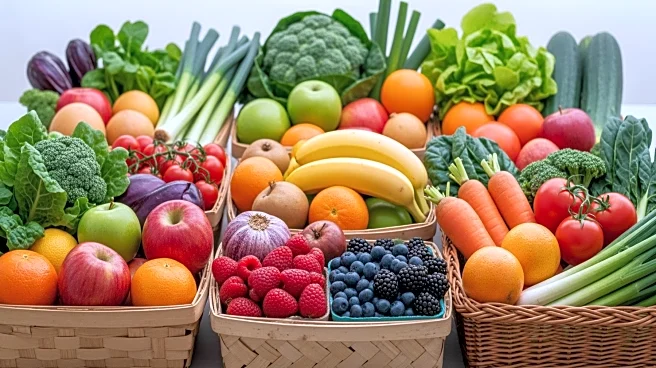What's Happening?
The ongoing government shutdown has led to a potential freeze in Supplemental Nutrition Assistance Program (SNAP) benefits, affecting over 42 million low-income Americans, including 16 million children. As the situation unfolds, food banks and organizations
across the United States are ramping up efforts to provide critical nutritional assistance. City Harvest, Feeding America, and other groups are actively distributing food and resources to those in need. DoorDash has announced an emergency food response, delivering 1 million free meals through Project DASH and waiving delivery fees for SNAP recipients at various grocery stores. The crisis has prompted a nationwide call to action, with community fridges, food pantries, and food rescue sites stepping in to support affected families.
Why It's Important?
The potential disruption of SNAP benefits due to the government shutdown poses a significant threat to food security for millions of Americans. SNAP is a vital program that provides nine meals for every one meal provided by Feeding America, highlighting its importance in the national food system. The freeze in funding could exacerbate existing issues of food insecurity and poverty, forcing families to make difficult choices between essentials like food and rent. Organizations like City Harvest and Feeding America are crucial in mitigating the impact, but the situation underscores the need for strategic planning and long-term solutions to address poverty and food insecurity in the U.S.
What's Next?
As the government shutdown continues, food banks and organizations are preparing to support an increasing number of individuals who may find themselves in need of food assistance. City Harvest has committed to rescuing and delivering food to New Yorkers affected by the shutdown, while DoorDash and Gopuff are providing emergency food delivery services. The situation remains fluid, with organizations calling for community support and donations to sustain their efforts. The broader implications of the SNAP funding freeze will likely prompt discussions on policy reforms and the need for robust safety nets to protect vulnerable populations.
Beyond the Headlines
The SNAP funding crisis highlights deeper issues within the U.S. food system and the reliance on government programs to ensure food security. The situation raises ethical questions about the adequacy of current policies in addressing poverty and food insecurity. It also underscores the importance of community solidarity and the role of non-profit organizations in filling gaps left by government shortcomings. Long-term shifts may include increased advocacy for policy changes and a reevaluation of how food assistance programs are structured and funded.
















